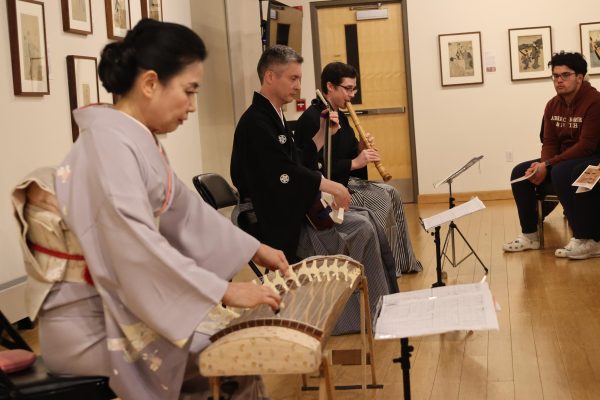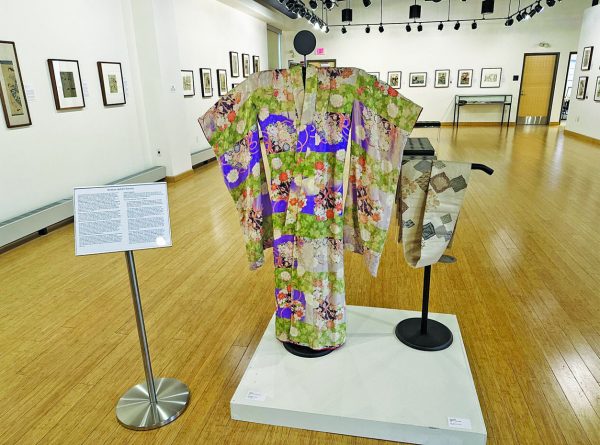Deadly Nurses Latest Topic in ‘Deadly Medicine’ Series
March 9, 2017
As the campus community is awaits the final speaker of the “Deadly Medicine” series, Eva Mozes Kor, survivor of the Mengele twin experiments, the learning and reflection continued with Dr. Thomas Hajkowski, Associate Professor of History, who gave a lecture that addressed a unique topic: nurses.
Hajkowski’s Feb. 22 lecture, called “The Medical Professional and the Nazi Regime,” explored the role of nurses in Nazi Germany and their culpability for the atrocities committed before and during World War II.
Hajkowski said it is interesting to explore the largely untold story about the intersection of the nursing profession and the Holocaust.
“The role of nurses is largely overlooked,” Hajkowski said, “and it’s only really in the past decade that scholars have been doing really serious research on the role of nurse.”
Hajkowski said the the diversity of the talks in the “Deadly Medicine” series present an opportunity to draw onto the subject of history.
“I think of all the talks, with the possible exception of the talk by Patricia Rice, this is the most historical, and so it’s great to have Art Caplan talk about ethics, and it’s great to have our local Rabbis talk about this issue as well. But I think it’s a good compliment to those talks that has something really historically grounded to get the big picture on some of those issues,” said Hajkowski.
Hajkowski found all the previous talks arranged by Dr. Amanda Caleb, Associate professor of English, excellent.
“The quality of the speakers— the outside speakers that Dr. Caleb has brought are extraordinary,” said Hajkowski. “I mean, Dr. Rice works at the Holocaust museum, Art Caplan is a world renown ethicist, you know our last speaker is a Holocaust survivor, so I am just really happy to be just a small part of this line up. I feel like a little bit of a piker compared to some of the names on the press material, but I think it’s a great series and Dr. Caleb’s done a tremendous amount of work to put it all together.”
Hajkowski’s lecture grew steadily into its focus on nurses, and he admitted he initially did not know what he was going to speak about.
“As I said in the beginning of the lecture, I wasn’t entirely sure what I wanted to talk about other than it had something to do with medicine and health. I do teach classes on the Holocaust and Nazism here at Misercordia so I had that background moving forward, and so it really was just a process of elimination, because medicine and healthy and the Holocaust are just such an enormous issue. There were literally dozens of things I could have talked about, from the origins of eugenics to the development to Nazi medical ideas to how they’re implemented to the role of doctors and so on,” said Hajkowski.
He explained that he thought he would write about nurses and doctors, but he realized that there was too much information to address both.
“[The lecture] really gave me a chance to stretch a little bit, to do some research in an area I wasn’t really familiar with at first, you know nursing and the Third Reich. So that was the process, and overall it was really rewarding.”
Students responded to Hajkowski’s lecture with strong feelings, as the talk largely focused on the misconduct of nurses and a general lack of morality that pervaded Nazi Germany at the time.
“This talk— he was really good, so it has nothing to do with him— but it made me very frustrated very quickly,” said freshman nursing major, Miranda Moser, “because there’s no acceptable reason to me why nurses would turn on their patients like that. He provided some reasons where I could kind of see why a select few would make that ruling, but for the most part I just can’t fathom why it worked that way.”
Kylie Hibbett, also a a freshman nursing major, said she, too, was unable to understand the motivation of the nurses.
“My first thought was how does someone psychologically deal with that? Like, you know what you’re doing. Even in the case where they didn’t know and they found out afterward, they still know. How do you deal with that for the rest of your life? I know that some people actually believed in this, but for the people that didn’t, how do you deal with that?”
Moser found the lack of resistance on the nurses’ part disturbing.
“Like I said, I don’t think their reasons were that good. Maybe for like, five percent of people who truly felt that way, yeah sure, but he even pointed out they were allowed to choose to do it. So in some way they had to acknowledge and accept and even promote doing the exact opposite of your job, so it’s very disheartening.”
The “Deadly Medicine” series ends March 14, with Eva Mozes Kor, survivor of the Mengele twin experiments.
The series has been the subject of increasing attention since it opened in January, and it continues to draw interest even as as it draws to an end.







